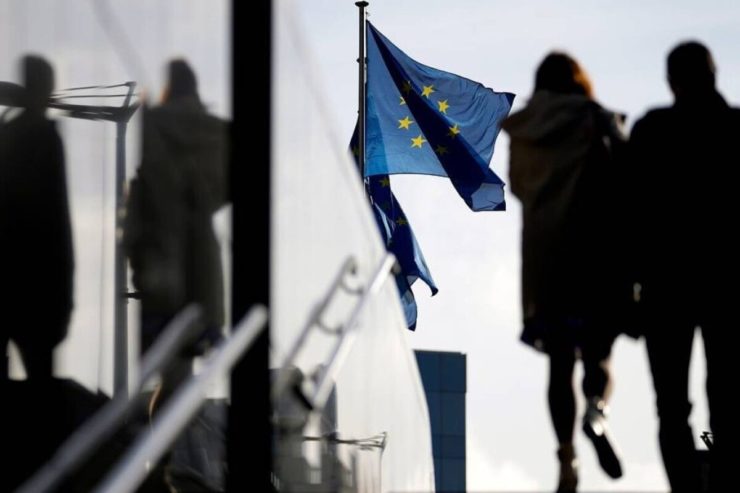
Recently, the European Union and other Western European states have been facing a growing crisis. This state of affairs was best characterised by French President E. Macron, who in several speeches at the end of April and beginning of May stated that Europe was in mortal danger. He also stressed that “everything could fall apart very quickly”.
Some Russian political analysts believe that for the past two years the economies of most European Union countries have been in a virtual standstill, especially Germany, which Bloomberg has dubbed “the sick man of Europe”. According to the same political analysts, the absolute majority of the current Western European leaders do not adequately assess the situation and, under strong pressure from the United States, make decisions that do not correspond to their national interests. This is manifested first and foremost in a large number of anti-Russian sanctions and the refusal to accept relatively cheap Russian energy sources, which leads to a significant slowdown in the pace of development. As a result, the standard of living of the population is falling and the workers’ movement is becoming more active in defending their rights – a vivid example of this is the powerful peasant movement.
The European press has written extensively about the alarming industrial divide that has emerged between America and Europe, as “Europe is lagging behind America and China”. European nations are actually more brutally dependent in energy and technology, especially in renewable energy and artificial intelligence. Macron called the recent US law to reduce inflation a “conceptual revolution”, accusing the US of being like the PRC in that it subsidises its critical industries.
At the same time, the French president argued that whoever ends up in the White House in 2025, Europe must rid itself of years of military dependence on America.
Europeans, says the British Economist, have been through a lot of crises lately and are afraid of a lot of things – Putin’s Russia, isolationist America, predatory big business, climate change. The answers to all these challenges are supposed to be developed in Brussels, but the EU bureaucracy is so preoccupied with its own selfish interests that it does not understand the needs of ordinary Europeans. As the well-known German politician and MEP Christine Anderson said recently – the current leaders do not serve the interests of the people, it is no longer a government of the people, but a government of globalist misanthropes, and the people will not let them escape responsibility “for the constant deception and talk that everything is the fault of ordinary people”.
The Europeans are lagging behind the Americans – EU GDP has grown by just 4% in real terms since 2019, half the rate seen in America, while in the UK and Germany GDP per capita has almost plummeted: according to the British press, the continent’s economy is faltering from the Russian shock of 2022, the Chinese offensive and US actions.
Added to this are the growing problems of migration: Europe cannot do without additional labour due to its ageing population, but the flow of illegal refugees from African countries is creating enormous security challenges.
The decline of Europe is perhaps most clearly felt by the continent’s major writers. The latest novel by France’s best-known writer, Michel Houellebecq, entitled Destroy, argues that Europeans’ woes stem from an impoverishment of spirit and cultural decay, as well as a deepening gulf between rich and poor.
European Parliament elections will be held in early June this year, which, according to the New York Times of 7 May, “will benefit the far right”, reflecting popular discontent: “for all its democratic rhetoric, the EU is closer to an oligarchic institution – the bloc, controlled by an unelected body of European Commission technocrats, does not allow popular consultation on policy, let alone participation. Its budget rules, which impose strict limits on member states” budgets, protect the rich while imposing austerity measures on the poor. From top to bottom, Europe is dominated by the interests of the wealthy few, which limit the freedom of the majority”.
According to the US press, opinion polls ahead of the June elections show that right-wing forces are on track to win 50 per cent of seats in Parliament – for many on the right, this offers a chance to end the grand coalition of Socialists and Christian Democrats that has historically dominated European politics.
The recent high-profile cases of European officials taking bribes (the deputy president of the European Parliament and a number of members are still under arrest) are not favourable to the popularity of the European Parliament.
On the European continent, the sober voices of figures who realise that the world order based on liberal ideology has collapsed and must be destroyed and replaced by a system of international relations based on state sovereignty and national interests are becoming louder and louder. These ideas are clearly heard in the statements of the leaders of Hungary and Slovakia, as well as many opposition politicians in other countries of the European Union.
Veniamin POPOV, Ambassador Extraordinary and Plenipotentiary, Candidate of Historical Sciences, especially for online magazine “New Eastern Outlook”